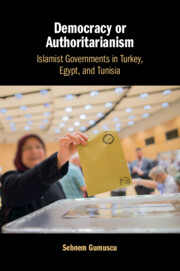Crossref Citations
This Book has been
cited by the following publications. This list is generated based on data provided by Crossref.
Fisher-Onar, Nora
2022.
The Capitulations Syndrome: Why Revisionist Powers Leverage Post-Colonial Sensibilities toward Post-Imperial Projects.
Global Studies Quarterly,
Vol. 2,
Issue. 4,
Aydin-Cakir, Aylin
2023.
Duration of the constitution-making process as an indicator of post-constitutional political uncertainty: The insurance theory revisited.
Global Constitutionalism,
Vol. 12,
Issue. 2,
p.
298.
Yilmaz, Ihsan
and
Shukri, Syaza
2024.
Islamist Parties and Power in Democratic Nation-States.
p.
15.
Yilmaz, Ihsan
and
Shukri, Syaza
2024.
Islamist Parties and Power in Democratic Nation-States.
p.
209.
McCarthy, Rory
2024.
Islamism, party change, and strategic conciliation: Evidence from Tunisia.
Party Politics,
Vol. 30,
Issue. 6,
p.
1064.
Gumuscu, Sebnem
2024.
The AKP and stealth Islamization in Turkey.
Turkish Studies,
Vol. 25,
Issue. 3,
p.
371.
Esen, Berk
2025.
Judicial transformation in a competitive authoritarian regime: Evidence from the Turkish case.
Law & Policy,
Vol. 47,
Issue. 1,
2025.
Contesting Pluralism(s).
p.
141.
2025.
Contesting Pluralism(s).
p.
179.
2025.
Contesting Pluralism(s).
p.
3.
2025.
Contesting Pluralism(s).
p.
300.
2025.
Contesting Pluralism(s).
p.
5.
Lynch, Marc
2025.
What is the Middle East?.
Grewal, Sharan
2025.
The Islamist Advantage: The Religious Infrastructure of Electoral Victory.
British Journal of Political Science,
Vol. 55,
Issue. ,
2025.
Contesting Pluralism(s).
p.
139.



